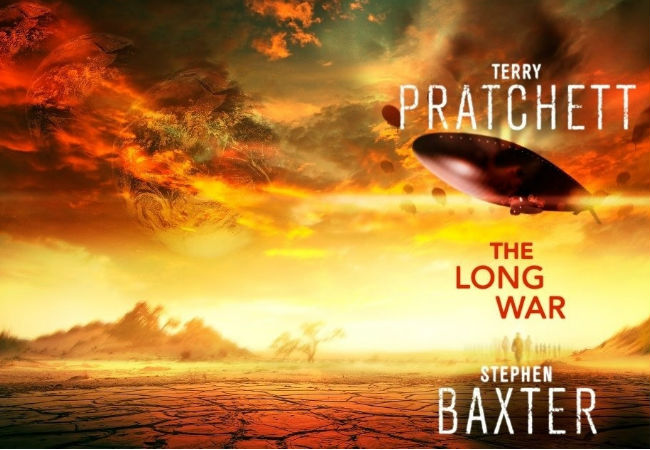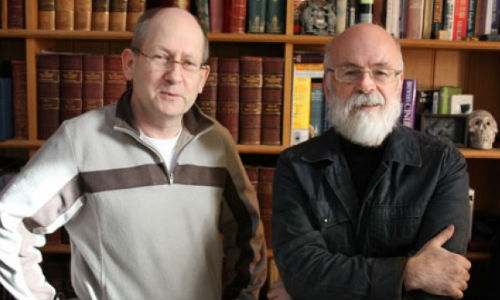
The Long War, the collaborative successor to Terry Pratchett and Stephen Baxter’s best-selling The Long Earth is a curiously unsatisfying book.
As ambitious as you could want in scope – it details humanity’s simultaneously flawed and wonderstruck, and sometimes conflict-riddled, continued expansion into the endless succession of multiple earths, some similar, some wildly different to our “Datum Earth” that make up the Long Earth – it pulls up vastly short in execution, thanks to a plot which is largely missing in action.
Rather than building up to a mighty battle between enemies at the title might suggest – or even a slowly burning Cold War of sorts – it is more a collection of studies in character arcs, heavy if imaginative exposition, and breathtakingly vast world building, reading more like a National Geographic or David Attenborough BBC special than a conventional narrative-driven book.
In a sense that isn’t such a bad thing.
One element often missing from many books which launch themselves off a wildly unusual premise, such as the one that underpins this series, is that they fail to make the most of it.
Yes, the characters populating those books go on amazing, highly readable adventures, tales so gripping you can’t help but read along.
But in truth they could happen anywhere, their setting barely stillborn, your longing to see it spring to life and become an entity unto itself – which a created world should be if it’s seem to real enough to a reader – left cruelly unfulfilled.
To The Long War‘s credit, that need for a viable, authentic world, rich in difference, history and culture is more than met with long passages given over to describing the various wildly-different iterations of the earth that the various characters come across.
You are treated to insights into why certain earths are Jokers – that is planets with human-uninhabitable ecologies that seem to be a joke on nature’s part rather any real attempt at a fully-functioning ecosystem – how the colonial history of countries like the USA are being recreated on a multitude of worlds eager for independence from faraway governments, and how humanoid species like the melodious Trolls, the devious Kobolds and the warrior-like Beagles are reshaping what it means to be sapient.
It is fascinating, well thought out stuff, and compelling enough for a knowledge junkie like myself, always eager for new worlds to explore even if they’re in my mind, to keep my reading right through all 419 pages.
All of which would have been fine if I was reading An Annotated Illustrated History of The Long Earth and its Wars and Struggles.
But I was not.

What I was ostensibly reading was a book that purported to be about the way in which humanity perpetuated many of the failures of civilisation that had blighted the so-called Datum, or original, Earth – lack of respect for other peoples’ culture and human rights, the need to exploit and grow rich triumphing over respect for the natural world, self-interest bettering the common good, and so on – leading once again to conflict, enslavement and the despoiling of an endless supply of Edens.
Properly exploited, with a plot that deftly brought these conflicts to life, The Long War would have made a richly well-rounded book, a satisfying blend of intelligent insight, and heart-thumping narrative that would have examined these many weight issues within the context of character-driven adventure.
Unfortunately, readable and imaginative though it is, what you do get is a series of half-realised stories, populated by characters like Long Earth pioneers and old, if prickly, friends Joshua Valiente and Sally Linsay, sentient artificial lifeform Lobsang (the reincarnated, alogorithm dwelling soul of a Tibetan motorcycle mechanic no less), well-meaning, enlightened military office Captain Maggie Kauffman and ailing cop Monica Jansson, among many, many others.
All highly engaging and fascinating people who you want to spend a great deal of time with, all of whom only make it so far plot-wise before things are wrapped up in a bow so neat and hurriedly produced that you are left wondering what happened to the rest of the story.
They are left half-formed, stranded in their various plot threads, only being brought together at a book ending social function thrown to celebrate the end of a war that never really got started, a scene that is reminiscent of those movies and TV series that come up with an artificial excuse to get all your favourite characters together at the one time.
While it ends on a poignant note, and is eminently readable and engaging as far as it goes, it is robbed of much of its potential as a book by a half-baked plot that appears thrown together simply as a means on which to hang a succession of disparate facts and insights.
Read it by all means but keep in mind that you are reading something more akin to a knowledge-rich documentary than a true narrative-driven book, the latter of which both Pratchett and Baxter have been writing successfully for years.
Quite why they didn’t manage it with The Long War (or indeed its predecessor) is a mystery.
If Stephen Baxter was paid 10 cents for writing “The Long War” he should return the money.